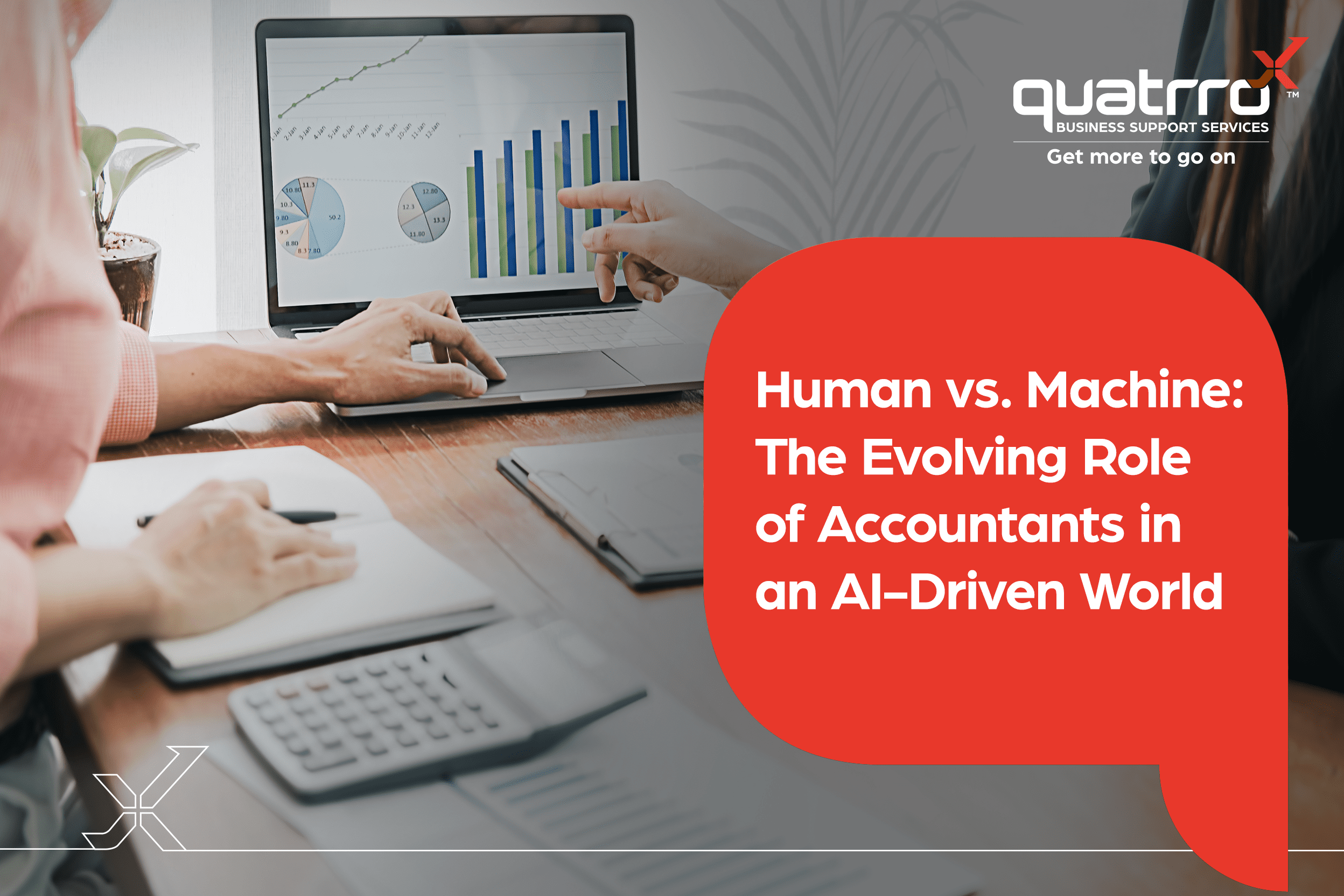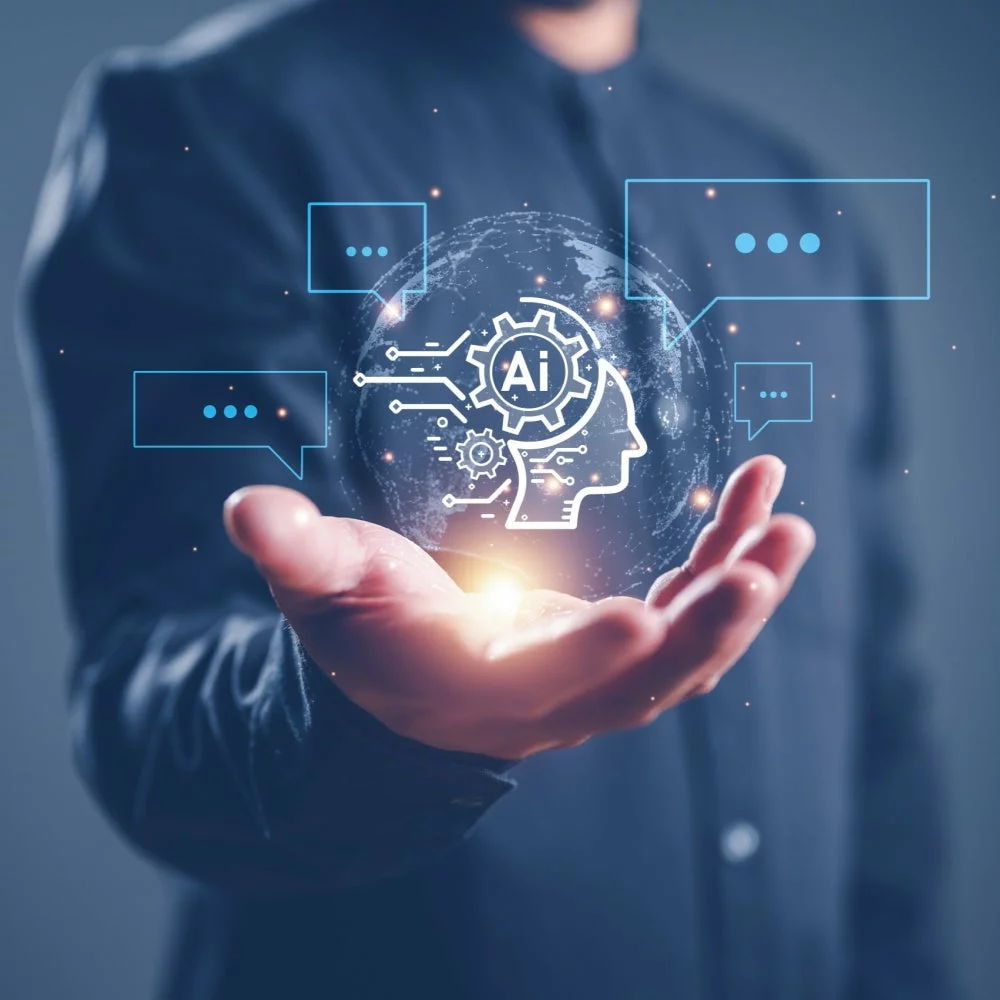Blog Details
Human vs. Machine: The Evolving Role of Accountants in an AI-Driven World
November 15, 2023

Artificial Intelligence is driving change across nearly every industry and sector, and the field of accounting is no exception.
But to state that AI is “coming for accounting jobs” is far too simplistic. Rather, the rise of AI, machine learning, and data analytics tools are redefining the role of accountants in complex ways and challenging the traditional practices within the profession.
So, how is the role of “accountant” likely to evolve in an AI-powered world?
The Benefits of AI-Powered Accounting
AI-powered tools are not replacing accountants but rather enhancing their capabilities and allowing them to bring more value to their organizations:
 |
Time Savings:AI can perform tasks much faster than humans. Repetitive accounting functions, such as data entry and invoice processing, are completed in a fraction of the time, freeing accountants to focus on more strategic work. Automation also provides a clear and comprehensive audit trail, making it easier to trace and verify financial transactions, enhancing transparency and accountability. |
 |
Reduced Errors:Human errors in data entry and calculation plague the field of accounting. AI- driven automation reduces the risk of mistakes, ensuring remarkably accurate and consistent results, which is crucial to avoid financial discrepancies and compliance issues. |
 |
Enhanced Financial Analysis:AI-based accounting tools provide real-time data processing and analysis, enabling stakeholders to gauge the health of their businesses and make quicker and more informed decisions based on up-to-the-minute insights. |
 |
Improved Compliance and Security:AI can help ensure regulatory and tax compliance by systematically following rules and regulations in data processing and reporting. These tools can also identify irregularities and discrepancies in financial transactions, including those that might indicate potentially fraudulent activities, improving the accuracy and integrity of financial reports. Through encryption, access controls, and regular monitoring, AI also reduces the risk of data breaches and unauthorized access. |
What Does this Mean for Accountants?
Accounting roles aren’t going away, but they will evolve as more and more organizations embrace AI-driven tools. So what will the role of an accountant look like in the coming years?
 |
From Data Entry to Data InterpretationAs AI takes over tedious data entry tasks, accountants are transitioning to higher-value functions. They are becoming interpreters of financial data, providing context, analysis, and recommendations based on the insights generated by AI. This shift allows accountants to bring more strategic value to their organizations. |
 |
Advisers and ConsultantsAccountants are increasingly seen as financial advisers and consultants rather than just recordkeepers. With AI handling routine financial functions, accountants can dedicate more time to understanding their organization’s unique financial challenges and developing strategies to overcome those obstacles and achieve their goals. |
Ethical OversightAs AI becomes more integral to accounting, accountants must also play a role in ensuring ethical practices when it comes to generating advice for best practices. Although AI can be used to significantly reduce errors with computations and compliance, professionals will still need to monitor AI systems for biases when prompting AI for compliance suggestions with financial regulations. In this regard, accountants will serve as ethical guardians of AI-driven financial processes. |
How Can Accountants Prepare for an AI-Driven Future?
While the role of accountant is here to stay, it’s important that those working in the field take steps today to future-proof their careers for a world of AI and machine learning.
Stay Informed: First and foremost, stay informed. The world of AI is continually evolving, with new tools and technologies being developed at a breakneck pace. Accountants should keep an ear to the ground, read the latest reports, and engage with industry news to understand how AI is impacting the accounting field. Staying on top of the latest financial and accounting regulations, especially those that may relate to AI and automation in accounting, is also crucial.
Enhance Technical Competencies: The ability to effectively wield AI-powered accounting tools is quickly becoming an essential skill for those in the field. Accountants also need to enhance their understanding of data protection and cybersecurity, especially when AI systems are processing sensitive financial information.
Acquire Proficiency in Data Analytics: AI may excel at data analysis, but human judgment is irreplaceable. Accountants should develop their data analysis skills to interpret AI-generated insights, interpret patterns, and draw meaningful conclusions. Organizations will value an accountant who’s able to provide context and turn data into actionable insights that facilitate proactive decision-making and revenue growth.
Make Professional Connections: Joining professional organizations and attending industry events nurtures valuable professional connections and allows an accountant to stay up-to-date on the latest trends, including those related to AI. Seeking mentorship from peers who already have experience in AI-driven accounting work can prove invaluable when navigating today’s rapidly changing landscape.

Conclusion
While AI will forever change the field of accounting, machine learning is no substitute for a human accountant. Accounting professionals with the technical and analytical prowess to interpret the output of AI-powered tools and provide their organizations with actionable insights based on the data will always be in demand.

